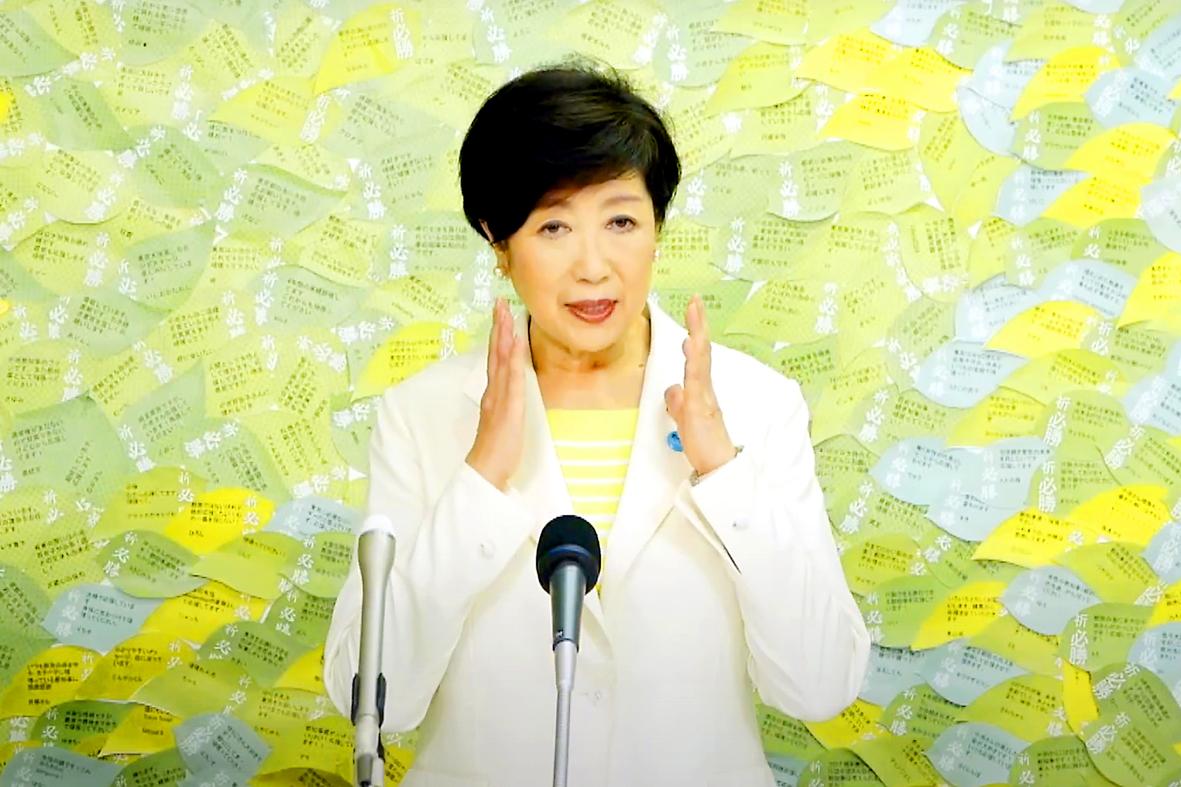Tokyo Governor Yuriko Koike yesterday won a second term to head the Japanese capital, buoyed to victory by public support for her COVID-19 pandemic handling, despite a recent rise in infections that has raised concerns of a resurgence of the disease.
In her victory speech, Koike pledged to do her utmost to take measures to protect Tokyo residents amid the pandemic.
“The most pressing task is coronavirus measures,” she said. “Now is a very important time to prepare for a possible second wave, and I will continue to firmly take steps.”

Photo: AP
Japan Broadcasting Corp said its exit polls showed that 74 percent of respondents supported Koike, with 63 percent saying they approved of her handling of the coronavirus crisis.
The first woman to head Tokyo, Koike, 67, is viewed as a potential candidate to succeed Japanese Prime Minister Shinzo Abe when his term ends in September next year.
For now, she says she is focused on protecting the lives of the 14 million people in Tokyo, a megacity with a US$1 trillion economy.
“Fighting against the coronavirus for the residents of Tokyo is my first and foremost responsibility,” she said on the eve of the election.
In her campaign message online, Koike pledged to balance disease prevention and the economy under Tokyo’s “new normal.”
Tokyo’s infections late last month started to rebound to reach 131 confirmed cases on Saturday, topping 100 for a third straight day and hitting a two-month high.
New daily cases have also spiked in the past few weeks nationwide to about 19,700, including 977 deaths.
Koike’s challengers included popular actor-turned-politician Taro Yamamoto and veteran lawyer Kenji Utsunomiya.
Yamamoto wanted to cancel the Tokyo Olympics — which were postponed from this summer to next summer — and use the funds to help people hurt by the coronavirus crisis.
Utsunomiya called for better welfare support for a more inclusive and diverse society.
Koike’s victory was expected, with a recent poll by the Mainichi newspaper having her leading her opponents by a wide margin.
Outside a polling station in downtown Tokyo, retiree Hidekazu Tamura said he voted for Koike because of her effort to secure the Olympics.
“I say no to anyone who is against the Olympics,” he said.
Another voter, Yojiro Tsuchiya, said he does not think Koike has addressed growing concerns about the latest jump in infections.
Among other things, Koike has said Japan should have its own version of the US Centers for Disease Control and Prevention.
She also tried to gain public understanding for a simpler version of the Tokyo Olympics after the Games were postponed.
Although Koike has not fully delivered on promises to Tokyo residents to relieve congestion on commuter trains, ensure adequate availability of child and elderly care facilities and end overwork, even her critics have generally lauded her handling of the pandemic.
That is in sharp contrast to Abe, who has been criticized for doing too little, too late.

LONG FLIGHT: The jets would be flown by US pilots, with Taiwanese copilots in the two-seat F-16D variant to help familiarize them with the aircraft, the source said The US is expected to fly 10 Lockheed Martin F-16C/D Block 70/72 jets to Taiwan over the coming months to fulfill a long-awaited order of 66 aircraft, a defense official said yesterday. Word that the first batch of the jets would be delivered soon was welcome news to Taiwan, which has become concerned about delays in the delivery of US arms amid rising military tensions with China. Speaking on condition of anonymity, the official said the initial tranche of the nation’s F-16s are rolling off assembly lines in the US and would be flown under their own power to Taiwan by way

CHIP WAR: The new restrictions are expected to cut off China’s access to Taiwan’s technologies, materials and equipment essential to building AI semiconductors Taiwan has blacklisted Huawei Technologies Co (華為) and Semiconductor Manufacturing International Corp (SMIC, 中芯), dealing another major blow to the two companies spearheading China’s efforts to develop cutting-edge artificial intelligence (AI) chip technologies. The Ministry of Economic Affairs’ International Trade Administration has included Huawei, SMIC and several of their subsidiaries in an update of its so-called strategic high-tech commodities entity list, the latest version on its Web site showed on Saturday. It did not publicly announce the change. Other entities on the list include organizations such as the Taliban and al-Qaeda, as well as companies in China, Iran and elsewhere. Local companies need

CRITICISM: It is generally accepted that the Straits Forum is a CCP ‘united front’ platform, and anyone attending should maintain Taiwan’s dignity, the council said The Mainland Affairs Council (MAC) yesterday said it deeply regrets that former president Ma Ying-jeou (馬英九) echoed the Chinese Communist Party’s (CCP) “one China” principle and “united front” tactics by telling the Straits Forum that Taiwanese yearn for both sides of the Taiwan Strait to move toward “peace” and “integration.” The 17th annual Straits Forum yesterday opened in Xiamen, China, and while the Chinese Nationalist Party’s (KMT) local government heads were absent for the first time in 17 years, Ma attended the forum as “former KMT chairperson” and met with Chinese People’s Political Consultative Conference Chairman Wang Huning (王滬寧). Wang

OBJECTS AT SEA: Satellites with synthetic-aperture radar could aid in the detection of small Chinese boats attempting to illegally enter Taiwan, the space agency head said Taiwan aims to send the nation’s first low Earth orbit (LEO) satellite into space in 2027, while the first Formosat-8 and Formosat-9 spacecraft are to be launched in October and 2028 respectively, the National Science and Technology Council said yesterday. The council laid out its space development plan in a report reviewed by members of the legislature’s Education and Culture Committee. Six LEO satellites would be produced in the initial phase, with the first one, the B5G-1A, scheduled to be launched in 2027, the council said in the report. Regarding the second satellite, the B5G-1B, the government plans to work with private contractors